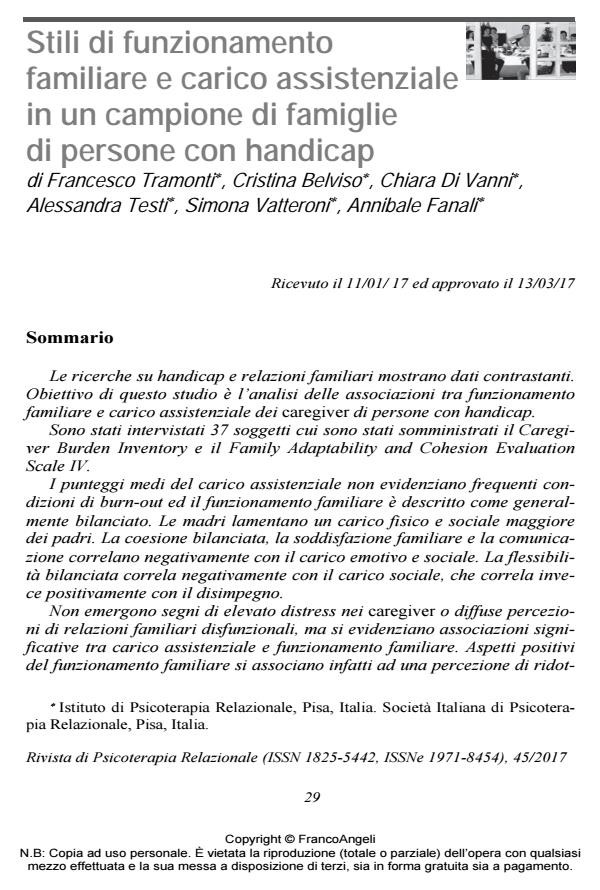Family functioning and caregiver burden in a sample of families of people with disability
Journal title RIVISTA DI PSICOTERAPIA RELAZIONALE
Author/s Francesco Tramonti, Cristina Belviso, Chiara Di Vanni, Alessandra Testi, Simona Vatteroni, Annibale Fanali
Publishing Year 2017 Issue 2017/45
Language Italian Pages 15 P. 29-43 File size 497 KB
DOI 10.3280/PR2017-045002
DOI is like a bar code for intellectual property: to have more infomation
click here
Below, you can see the article first page
If you want to buy this article in PDF format, you can do it, following the instructions to buy download credits

FrancoAngeli is member of Publishers International Linking Association, Inc (PILA), a not-for-profit association which run the CrossRef service enabling links to and from online scholarly content.
Research on disability and family relations reports mixed results. The aim of this study is to analyse the associations between family functioning and the burden of caregivers of people with disabilities. We have administered the Caregiver Burden Inventory and the Family Adaptability and Cohesion Evaluation Scale IV to 37 subjects. The mean scores of caregiver burden do not testify to frequent conditions of burn-out, and family functioning is described as generally balanced. Mothers complain higher levels of physical and social burden than fathers. Balanced cohesion, family satisfaction and communication correlate negatively with social and emotional burden. Balanced flexibility correlates negatively with social burden, which instead correlates positively with disengagement. It can be concluded that major signs of high distress in caregivers or widespread perceptions of dysfunctional family relationships don’t emerged, but our data show significant associations between caregiver burden and family functioning. In fact, positive aspects of family functioning are associated with the perception of a reduced burden, while negative aspects are associated with the perception of an increased burden.
Keywords: Load welfare, family, handicap, circumplex model.
Francesco Tramonti, Cristina Belviso, Chiara Di Vanni, Alessandra Testi, Simona Vatteroni, Annibale Fanali, Stili di funzionamento familiare e carico assistenziale in un campione di famiglie di persone con handicap in "RIVISTA DI PSICOTERAPIA RELAZIONALE " 45/2017, pp 29-43, DOI: 10.3280/PR2017-045002